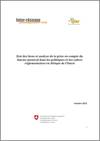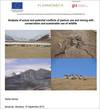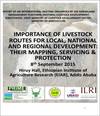Le terme foncier pastoral recouvre des réalités complexes qui renvoient à une gamme diversifiée de ressources localisées dans diverses zones dont l’accès est régi par droits divers. L’objectif de cette synthèse est d’analyser les politiques, les cadres juridiques et réglementaires relatifs au foncier et au pastoralisme mis en place par les États et les institutions de la région et d’examiner les initiatives récentes des partenaires en appui au pastoralisme. Elle vise à en tirer des leçons pour mieux envisager l’avenir du pastoralisme et les voies pour sécuriser la mobilité et renforcer la résilience.
Year of publication: 2015Organization:
Topic: Tierra, Participación
Language: Français
Type of document: Políticas y legislación
Geographical coverage: África Occidental
This study aims to strengthen peacebuilding through education initiatives designed to increase access to quality education for remote and marginalized communities, particularly nomadic pastoralists and agro-pastoralists. It explores how education might advance peacebuilding and community resilience in vulnerable contexts prone to conflict through UNICEF supported Alternative Basic Education (ABE) centers for pastoralist and agro-pastoralist children and youth.
Year of publication: 2015Organization: Fondo de las Naciones Unidas para la Infancia
Topic: Conflicto, Educación, Resiliencia
Language: English
Type of document: Técnico, Científico
Geographical coverage: África Oriental
This report reviews and analyzes in brief the actual and potential conflicts of pasture use, mining and protected areas development with wildlife conservation and sustainable use through hunting in Kyrgyzstan. It identifies issues to be considered in future projects on integrated land and natural resources management as well as in sector specific projects. Wild animals, including game species used for hunting, are an integral part of ecosystems and essential for their functionality and resilience. Given the uncertainties about the impacts of climate change, conservation and sustainable use of wild animals is an important element of adaptation. This is because it retains options for future land-use and increases the resilience of ecosystems and land-use systems.
Year of publication: 2015Organization: Sociedad Alemana de Cooperación Internacional (GIZ)
Topic: Conflicto, Servicios ambientales, Tierra
Language: English
Type of document: Científico
Geographical coverage: Asia Central
On Tuesday 8th September 2015 a meeting was held on the “Importance of Livestock Routes for Local, National and International Development: Their Mapping Servicing and Protection.”The meeting was organised through the Rangeland Management Platform – a forum organised by the Pastoral Livestock Development Directorate, State Ministry of Livestock Development Sector (MoA) and the Ethiopian Society of Agricultural Production/Pasture Rangelands Forum Ethiopia. The objectives of the meeting were: • To share experiences of mapping, servicing and protecting livestock routes in Ethiopia and neighbouring countries; and • To identify opportunities for better understanding, servicing and protecting livestock routes in future, and suggestions as to how this could be achieved in Ethiopia.
Year of publication: 2015Organization: Autores individuales, Coalición Internacional para el Acceso a la Tierra (ILC), Instituto Internacional de Investigación en Ganadería, Agence des États-Unis pour le développement international
Topic: Economía, Servicios ambientales
Language: English
Type of document: Técnico
Geographical coverage: África Oriental
This declaration, prepared at the meeting of Central Asian pastoralists in July 2015, calls on national governments, international organizations, the United Nations and civil society organizations to consult and include the Central Asian pastoralist network in workshops, conferences, policy processes and programmes that may affect pastoralism in Central Asia.
Year of publication: 2015Organization: Comisión Económica para África
Topic: Participación
Language: English, Русский
Type of document: Políticas y legislación
Geographical coverage: Asia Central
In China, three major rangeland management policies have caused dramatic social, economic, and ecological changes for pastoral regions in the past 30 years: the Rangeland Household Contract Policy (RHCP), Rangeland Ecological Construction Projects (RECPs), and the Nomad Settlement Policy (NSP). The impacts of these policies are greatly debated. This paper conducts a systematic review of academic perspectives on the impacts of the three policies on: the ecosystem, animal husbandry, pastoralist livelihoods, and pastoral society among other rangeland issues. In addition, it systematically reviews the causes of ineffectiveness and negative effects. As these three policy approaches are applied in rangeland management and pastoral development worldwide, this paper may provide useful implications for future policy development in pastoral regions on a global scale.
Year of publication: 2015Organization: Autores individuales
Topic: Servicios ambientales, Tierra
Language: English
Type of document: Técnico
Geographical coverage: Asia Central
This study reveals that there is clear demand from pastoralists and farmers in Malawi and Tanzania for climate information services via radio and mobile phone. Both radio and mobile phones are in common use, and are rated by farmers and pastoralists to have great potential as effective and trusted channels where they can access various climate information services. Rainfall patterns, temperature data and forecasting services – both weekly and daily – were mentioned as particular needs.
Year of publication: 2015Organization: Programa de Investigación sobre Cambio Climático, Agricultura y Seguridad Alimentaria (CCAFS)
Topic: Cambio climático, Educación, Resiliencia
Language: English
Type of document: Técnico, Científico
Geographical coverage: África Oriental, África Meridional
The theoretical framework for the scientific understanding of the drylands is almost the opposite today of what was mainstream in the 1970s, but the methodological infrastructure of analytical tools and practices is still catching up. As researchers and practitioners involved in dryland development depend on such infrastructure, they are often in danger of silently reproducing the old theoretical horizon even when manifestly operating in the new one. This is the issue this paper sets out to discuss.
Year of publication: 2015Organization: Instituto Internacional de Medio Ambiente y Desarrollo (IIED)
Topic: Resiliencia
Language: English
Type of document: Científico
Geographical coverage: Global









